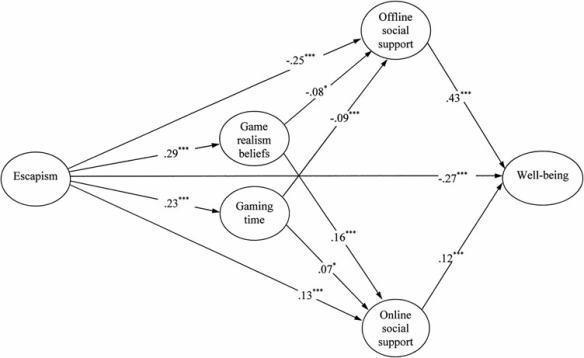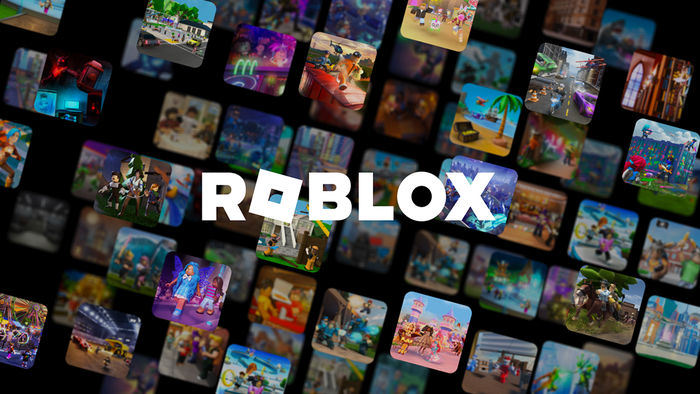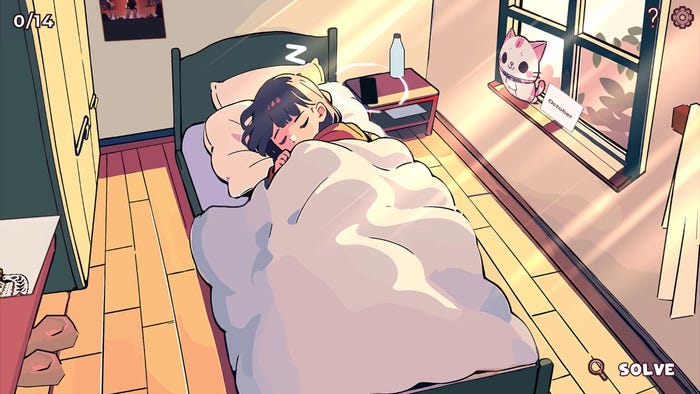
Featured Blog | This community-written post highlights the best of what the game industry has to offer. Read more like it on the Game Developer Blogs.
A mediated relationship between escapism and well-being among MMO players
Players with escapist motivation endorsed stronger game realism beliefs and spent more time playing MMORPGs, in turn increased online support but decreased offline social support. Well-being was affected by both online and offline social support

Lukasz Kaczmarek (Adam Mickiewicz University) and Drążkowski (Adam Mickiewicz University) has published a survey study on the mediated relationship between escapism and well-being in Cyberpsychology, Behavior, and Social Networking.
Abstract
Massively multiplayer online role-playing game (MMORPG) escapists are individuals who indulge in the MMORPG environment to avoid real world problems. Though a relationship between escapism and deteriorated well-being has been established, little is known about particular pathways that mediate this relationship. In the current study, we examined this topic by testing an integrative model of MMORPG escapism, which includes game realism beliefs, gaming time, offline social support, and online social support for offline problems. MMORPG players (N=1,056) completed measures of escapist motivation, game realism beliefs, social support, well-being, and reported gaming time. The tested structural equation model had a good fit to the data. We found that individuals with escapist motivation endorsed stronger game realism beliefs and spent more time playing MMORPGs, which, in turn, increased online support but decreased offline social support. Well-being was favorably affected by both online and offline social support, although offline social support had a stronger effect. The higher availability of online social support for offline problems did not compensate for the lower availability of offline support among MMORPG escapists. Understanding the psychological factors related to depletion of social resources in MMORPG players can help optimize MMORPGs as leisure activities.
This post is cross-posted at VG Researcher.
Escapism is among the motivations cited for playing massively multiplayer online games, it is also recognized to have some detrimental effects on one’s well-being. This is because players motivated by escapism, termed as an avoidant coping strategy, play online to avoid real life problems. Nevertheless, these problems cannot be ignored forever, some individuals may seek out support from their friends and families. Online friends’ support can be sought as well, although we do not know how social support in online gaming is effective for one’s well-being.
Videogame realism is a concept with connections to escapist motivations. Escapism is tied with the motivation to move away from the real world and immerse oneself into another world. This other world would seem more realistic to escapists even further. The extent of this videogame realism depends on well perceived the game is, both mechanically (e.g. graphics) and socially (e.g. players and chat system). The more realistic and the more one’s desire to escape may translate into spending more time in the game. The more realistic they find the game, the greater importance they feel from the support they receive from their online friends which can affect their well-being.
Method
Participants: 1053 online respondents. The respondents were from MMORPG message boards. The respondents played World of Warcraft (30.9%), Tibia (11.1%), Lineage 2 (10.4%), Eve Online (6.16%), Guild Wars (5.49%), Silkroad Online (5.49%), Maple Story (2.75%), MU Online (2.65%), and Warhammer Online (1.89%). Average age is 18.64 (SD=5.12) and male (93.3%).
Measures
Well-being: They used the Steen Happiness Index, where participants pick one statement out of 20 that best represents their feelings during the past week.
Escapism: two items from the motivations of play in MMORPG scale from Beranuy et al. (2013). An example item is “I play so I can avoid thinking about some of my real life problems or worries”.
Perceived videogame realism: four items answered on a 7-point agreement scale. An example item is “I perceive the MMORPG environment as a direct reality”.
Gaming time: Participants reported the number of hours spent playing for each day of the week.
Offline and online social support: Eight items from the Berlin Social Support Scales assessing for instrumental and emotional social support. Participants were asked to think about people they know offline in order to assess for offline social support. As for online social support, items were modified to integrate online support for offline problems. The items were answered on a 4-point scale.
Results
The authors conducted a structural equation modeling examining the relationships between the variables. The model is presented below.

The model revealed that escapism significantly predicted increases in videogame realism, gaming time and online social support. Escapism predicted decreases in offline social support. The relationships are true with videogame realism and gaming time with increases to online social support and the opposite for offline social support.
The overall relationship between escapism and well-being with four mediating variables in between them revealed that escapism decreases well-being directly and indirectly. On the other hand, online social support predicted increases for well-being which was increased by higher escapism, videogame realism and gaming time. In a sense, escapism has both beneficial and adverse effects on well-being, but overall the adverse effects outweigh the beneficial ones.
Discussion
The take home message is that escapist motivations into online videogames is more nuanced, but generally leads to an adverse outcome for their well-being. As players with greater escapist motivations delved deeper into their online videogame world, they compensate for their decline of offline social support with greater online social support. However, the amount of online social support did not adequately compensate for the decline in well-being. The authors noted that the effects could be different if they asked how online social support can deal with offline and online problems. It is possible that online problems within the game might elicit online supportive behaviours (e.g. healing or co-op play).
The authors cautioned that the study is limited by its high proportion of male respondents. Second, there are probably more variables in between escapism and well-being. Third, their results can make some interpretation for causal effects, they advise experimental designs or a longitudinal study to further test their results.
The authors suggested that assessing players’ escapists motivation may help to identify at-risk individuals. This also applies for gaming time and videogame realism. On the other hand, I believe that the decline in offline social support can be compensated by establishing a social support system within videogames. Players may be inadequate in socially supporting other players due to various circumstances and motivations. Some players may be so lucky to have online friends who genuinely care for their real life problems. To test the idea that improving the quality of online social support is beneficial, I suggest examining whether a real life social support group in MMOs or guild can help individuals’ well-being. Another interesting avenue is the establishment of a mental health organization within an MMO environment, kind of like mental health or therapist gamers. However, talking to self-identified therapists might be intimidating, perhaps they can to confer with more approachable players, like bartenders or like Yui from Sword Art Online.
References
Kaczmarek, L. D., & Drążkowski, D. (2014). MMORPG escapism predicts decreased Well-Being: Examination of gaming time, game realism beliefs, and online social support for offline problems. Cyberpsychology, Behavior, and Social Networking, 17 (5), 298-302. DOI: 10.1089/cyber.2013.0595
Read more about:
Featured BlogsAbout the Author(s)
You May Also Like









